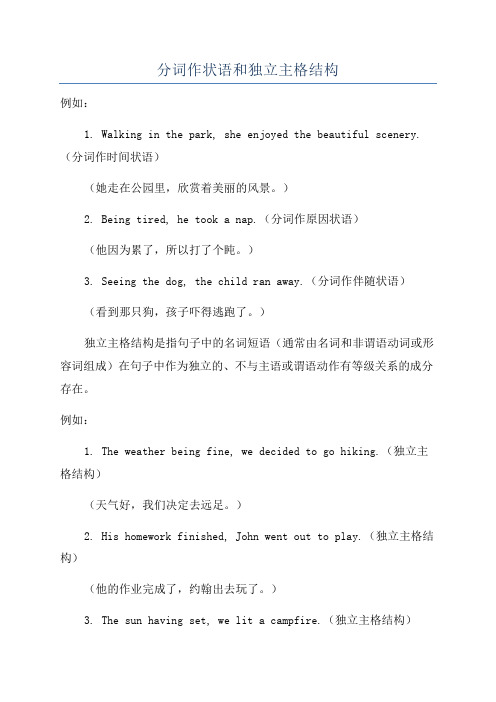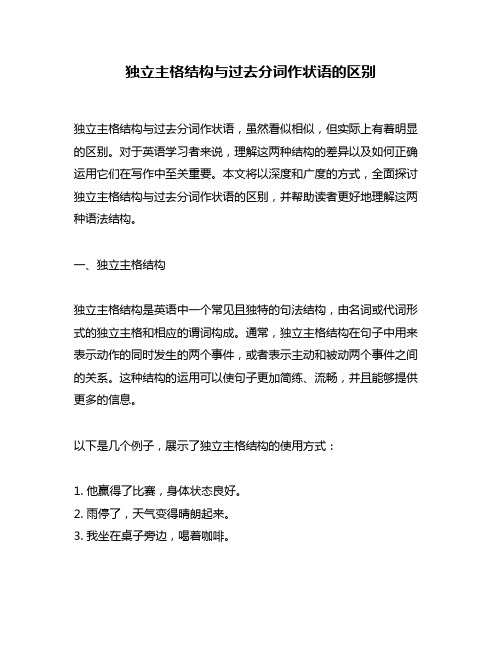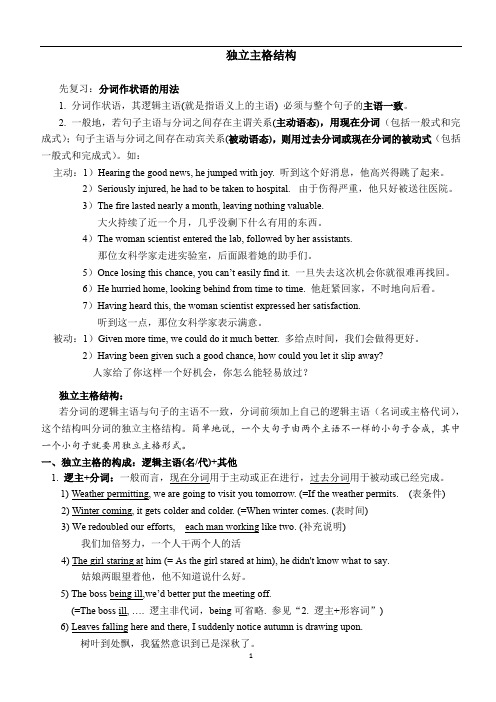独立主格结构练习 分词做状语
独立主格分词作状语合并的例句while

独立主格分词作状语合并的例句while摘要:I.独立主格分词作状语的概述- 独立主格分词作状语的定义- 独立主格分词作状语的语法功能II.独立主格分词作状语的例句- while 引导的独立主格分词作状语的例句- 其他引导词引导的独立主格分词作状语的例句III.独立主格分词作状语的合并方法- 合并的定义- 合并的方法及注意事项IV.独立主格分词作状语在实际应用中的优势与局限- 优势- 局限正文:独立主格分词作状语是英语中一种特殊的状语形式,它由一个分词结构(包括动词和其宾语)和一个主语构成,分词结构在句中扮演状语的角色,主语则独立存在。
这种结构在英语中有着广泛的应用,可以用来表示时间、原因、条件等多种关系。
在英语中,独立主格分词作状语可以通过不同的引导词来引导,如while、when、if 等。
其中,while 引导的独立主格分词作状语在英语中十分常见。
例如:While I was walking in the park, I met my friend.在这个例子中,while 引导的独立主格分词作状语“I was walking in the park”表示时间关系,即“我在公园散步的时候遇到了我的朋友”。
除了while 之外,还有其他引导词可以引导独立主格分词作状语,如:- When I entered the room, she was reading a book.- If he rains, we will stay at home.在实际应用中,独立主格分词作状语有着明显的优势。
首先,它可以使句子更加简洁,避免重复使用主语。
其次,它可以清晰地表达出句子中不同成分之间的关系,使句子更加连贯。
然而,独立主格分词作状语也存在一些局限。
首先,它要求分词结构和主语之间有明确的逻辑关系,否则可能会造成句子的混乱。
其次,由于分词结构在句中扮演状语的角色,因此它不能影响句子的时态和语态等语法特征。
总的来说,独立主格分词作状语是一种十分灵活和实用的英语表达方式。
分词作状语和独立主格结构

分词作状语和独立主格结构
例如:
1. Walking in the park, she enjoyed the beautiful scenery.(分词作时间状语)
(她走在公园里,欣赏着美丽的风景。
)
2. Being tired, he took a nap.(分词作原因状语)
(他因为累了,所以打了个盹。
)
3. Seeing the dog, the child ran away.(分词作伴随状语)
(看到那只狗,孩子吓得逃跑了。
)
独立主格结构是指句子中的名词短语(通常由名词和非谓语动词或形容词组成)在句子中作为独立的、不与主语或谓语动作有等级关系的成分存在。
例如:
1. The weather being fine, we decided to go hiking.(独立主格结构)
(天气好,我们决定去远足。
)
2. His homework finished, John went out to play.(独立主格结构)
(他的作业完成了,约翰出去玩了。
)
3. The sun having set, we lit a campfire.(独立主格结构)
(太阳已经落山,我们点燃了篝火。
分词做状语与独立主格结构详细例句

分词做状语与独立主格结构详细例句1时间状语Entering her room ,she found her computer stolenEntering her room ,she found her baby playing alone in the sitting roomSeeing from the top of the hill ,we can see the park clearlySeen from the space ,the Great wall is like a huge dragonSeen from the top of the hill ,the park is beautifulSeeing her mother ,the baby stopped cryingSeeing the cat ,the moust ran awaySeeing from the space, the earth looks greenReading the book ,he nodded from time to timeHearing his father’s voice ,the boy turned off the TV set at onceHearing their teache’s voice, the puiples stopped talking at onceHaving finished his homework, the boy went to bedHaving been shown Tianan’men Square ,the tourists were taken to visit the Palace MuseumHaving arrived at the farm ,the set to work immediatelyHaving watered the flowers ,he had a rest(While) Working in the factory, he was an advanced workerWhen leaving the airport ,she waved to us again and againWhen walking on the street ,I met one of my old friendsWhen crossing the street ,be careful(After) Having dinner, I will go to see a film.On hearing the good news ,they all jumped with joy2 原因状语Being busy now ,I can’t go fishing with youBeing angry ,he broke the cup into piecesBeing poor ,he couldn’t afford to buy the carBeing a teacher ,she is very kind to her studentsBeing ill ,the boy didn’t go to school this morningBeing too fat, you should take regular exercise to lose weight.Being seriously ill ,the girl was taken to the hospital immediatelyBeing a League member, he is always helping othersNot knowing his address ,I can’t get touch with himTaken good care of ,the old man is living a happy lifeNot given a chance, he felt disappointed.Written in a hurry, this article was not so good!Not knowing what to do, he turned to me for helpEncouraged greatly ,they worked even harderBerried deep down in the earth ,the dead forests rotten away and became coalHaving lived in the city for many years ,he knows the city very wellHaving received his letter ,he decided to write backHaving Left the key at home, he could not enter his officeHaving been bitten by a snake ,she was frightened at itHaving been kept indoor for the whole morning , the children became impatient Having been criticized by the teacher ,the student gave up smokingHaving been told to stay in Beijing ,the young man decided not to go back his hometown Not having received a reply ,he decided to write a letter againCaught in a heavy rain ,he was all wet3伴随状语The old man often takes a walk ,followed by his dogThe dog often takes a walk ,following its ownerShe came in the room ,following her husbandShe came in the room ,followed bu her husbandThe boy went to school ,taking a busJack came here ,runningHe stood there ,leaning agains the wallHe stayed at home, cleaning and washingAll night long ,he lay awake ,thinking of the problemHe sat in the sofa ,read a newspaperHe stood there ,waching the children playing gamesThe six blind men stood there ,begging for meal4让步状语Being rich ,he plants lots of vegetables himselfLiving miles away ,he attended the courseTrained ten hours a day ,he will still be a foolDefeated .he is still a popular boxerWorking so hard ,he failed againConsidering for so long a time, he had no idea about itHaving been told many times ,he still repeated the same mistakeHaving been told many times,he still could’t understand itHaving failed many times ,he didn’t lose heartExplained many time ,he still couldn’t understandThough lacking money ,his parents managed to seng him to universityThough warned the danger ,he still went skating on the thin iceAlthough working hard every day, we still have endless work to deal withThough raining heavily, it cleared up very soon5结果状语Her husband died ,leaving her with two sonsHe died ,leaving nothing for his wifeHis father died ,leaving him lots of moneyThe snow lasted for a week ,resulting in a serious traffic confusion in the whole areaTt has rained for several day, causing the river to riseThe bus was held up by snowstorm thus causing the dalayHe was caught in the rain ,making him catch a coldThey all left ,leaving me alone thereEnglish is spoken by many people in the world ,making it the most popular language in the world6条件状语Heated , water can change into vaporHeating water ,we can change it into vaporWorking hard ,you will succeedAdding themall up ,we can fingd the answerGiven a few minutes ,I will finish itTurning right ,you will find the stationListening to English every day ,you will learn it well step by step(If) Playing all day, you will waste your valuable time.Using your head ,you will fingd a good way.Grown in the rich soil ,the plants can grow betterTaking the path ,you will come to a lake独立主格结构原因状语It being Christmas, the government offices were closed.It being a holiday, all the shops were shut.The boy being late, his teacher was very angry.His mother being ill, he had to stay at home to look after herThe river having risen in the night ,crossing is impossibleThere being no bus, we had to walk home.spring coming, all the birds flew backThere being something more important to attend to, he had to cancel the appointment with me.时间状语The test finished, we began our holiday.The key having been lost ,she could not enter her roomThe meeting being over, all of us went home.Her work done, she sat down for a cup of teaThe question settled ,they went homeMy work having been finished ,I went homeAll the work finished, he sat down for a coffee.条件状语Weather permitting, we are going to visit you tomorrowTime permitting ,we will visit the summer palace伴随状语The mother was cleaning the house ,her baby palying on the bed。
分词作状语(附练习)

分词作状语(附练习)中学英语教学资源网→教学文摘→分词作状语2011-11-21 →手机版分词作状语是高考考查的热点和重要考点,其热点考查内容如下:一.确定分词形式分词作状语时,通常放在句首,并且用逗号与主句隔开。
同时,分词作状语时其逻辑主语与主句主语应保持一致,也就是说在确定选择现在分词还是过去分词时,要判断主句主语与分词中心词的关系。
如果句子的主语是动词-ing形式所表示的动作的发出者(即表主动或正在进行),分词形式选用现在分词;如果句子的主语是动词-ed形式所表示的动作的承受者时(即表被动或完成),分词形式选用过去分词。
例:1, _______, I stretched my hand out for it.A. I saw the book I wanted on the shellB. The book I wanted was on the shellC. Seeing the book lying across the deskD. Lying on the desk分析:分词作状语时,其逻辑主语应与句子的主语一致。
根据这一原则,可知句子的主语I 只能与see保持一致。
如果选A, 该句中没有连词,没能构成并列句和主从复合句,此时要选用非谓语动词形式。
所以选C2, Seen from the hill, the park looks very beautiful.分析:“Seen from the hill”是过去分词作状语。
分词作状语时,其逻辑主语应与句子的主语一致。
根据这一原则,可知,“the park”是“Seen from the hill”的逻辑主语,它们之间表示被动关系,所以分词形式用seen.二.确立句子主语可能是谁确立句子主语可能是谁时,仍然遵循分词作状语时其逻辑主语与主句主语应保持一致的原则。
反过来要根据分词形式确立句子主语。
例:Having been attacked by terrorists, _________.A. doctors came to their rescueB. the tall building collapsedC. an emergency measure was takenD. warning were given to tourists分析: 本题仍考查非谓语动词的用法。
分词和独立主格在句首作状语

分词及独立主格在句首作状语Dec 10, 2018分词在句首作状语,可用“从句还原法”,还原出状语从句。
如果还原出的从句是主动的,就选doing作状语; 如果还原出的从句是被动的,就选done 作状语。
注意:分词作状语的前提条件是,逗号前后的逻辑主语相同。
分词前常可保留的连词有when, while, once, if 等。
一.分词在句首作状语的结构:(Conj) Done / Doing…, sb…例如:1. Once formed, a bad habit is hard to kick.= Once it is formed, a bad habit is hard to kick.2. Hearing the good news, he jumped with joy.= When he heard the good news, he jumped with joy.二.独立主格在句首作状语的结构:Sth done / doing…, sb…1.The meeting being over, we all went home.= After the meeting was over, we all went home.2.My homework done, I went out to play football.= After my homework was done, I went out to play football.说明:其实,这两种独立主格作状语,可以看作分词作状语的特例。
特点是,分词的前边,保留自己的逻辑主语。
也就是,逗号前后的逻辑主语不一致。
而一般情况下,分词作状语,不保留自己的逻辑主语。
也就是,逗号前后的逻辑主语一致。
独立主格结构与过去分词作状语的区别

独立主格结构与过去分词作状语的区别独立主格结构与过去分词作状语,虽然看似相似,但实际上有着明显的区别。
对于英语学习者来说,理解这两种结构的差异以及如何正确运用它们在写作中至关重要。
本文将以深度和广度的方式,全面探讨独立主格结构与过去分词作状语的区别,并帮助读者更好地理解这两种语法结构。
一、独立主格结构独立主格结构是英语中一个常见且独特的句法结构,由名词或代词形式的独立主格和相应的谓词构成。
通常,独立主格结构在句子中用来表示动作的同时发生的两个事件,或者表示主动和被动两个事件之间的关系。
这种结构的运用可以使句子更加简练、流畅,并且能够提供更多的信息。
以下是几个例子,展示了独立主格结构的使用方式:1. 他赢得了比赛,身体状态良好。
2. 雨停了,天气变得晴朗起来。
3. 我坐在桌子旁边,喝着咖啡。
从这些例子可以看出,独立主格结构的谓词部分常常是一个动词的过去分词形式。
这与过去分词作状语的形式有点类似,但它们之间有着不同的用法和含义。
二、过去分词作状语过去分词作状语是一种常见的状语结构,用来修饰动作的方式、原因、时间或条件。
过去分词作状语通常位于句子开头或句子的中间,用来修饰整个句子或其中的某个成分。
它可以提供额外的信息,丰富句子的意义和表达。
以下是几个例子,展示了过去分词作状语的使用方式:1. 穿过森林,他找到了一家小屋。
2. 因为下雨了,他没有出去玩。
3. 在经历了一番波折之后,他最终成功了。
从这些例子可以看出,过去分词作状语的谓词部分也是一个动词的过去分词形式。
然而,过去分词作状语强调的是修饰整个句子或其中一个成分的状语关系,而不是像独立主格结构那样突出两个同时发生的事件或主动和被动事件之间的关系。
三、区别与用法尽管独立主格结构和过去分词作状语的形式相似,但它们之间存在着明显的区别。
了解这些区别可以帮助我们更加准确地运用这两种结构,并提高写作的表达能力。
独立主格结构强调的是两个同时发生的事件或主动和被动两个事件之间的关系。
高中英语 独立主格结构综合用法与练习

先复习:分词作状语的用法1. 分词作状语,其逻辑主语(就是指语义上的主语) 必须与整个句子的主语一致。
2. 一般地,若句子主语与分词之间存在主谓关系(主动语态),用现在分词(包括一般式和完成式);句子主语与分词之间存在动宾关系(被动语态),则用过去分词或现在分词的被动式(包括一般式和完成式)。
如:主动:1)Hearing the good news, he jumped with joy. 听到这个好消息,他高兴得跳了起来。
2)Seriously injured, he had to be taken to hospital. 由于伤得严重,他只好被送往医院。
3)The fire lasted nearly a month, leaving nothing valuable.大火持续了近一个月,几乎没剩下什么有用的东西。
4)The woman scientist entered the lab, followed by her assistants.那位女科学家走进实验室,后面跟着她的助手们。
5)Once losing this chance, you can’t easily find it. 一旦失去这次机会你就很难再找回。
6)He hurried home, looking behind from time to time. 他赶紧回家,不时地向后看。
7)Having heard this, the woman scientist expressed her satisfaction.听到这一点,那位女科学家表示满意。
被动:1)Given more time, we could do it much better. 多给点时间,我们会做得更好。
2)Having been given such a good chance, how could you let it slip away?人家给了你这样一个好机会,你怎么能轻易放过?独立主格结构:若分词的逻辑主语与句子的主语不一致,分词前须加上自己的逻辑主语(名词或主格代词),这个结构叫分词的独立主格结构。
分词作状语和独立主格结构

分词作状语和独立主格结构现在分词作状语:- Walking home, he saw a dog on the street.(现在分词作时间状语)- With the problem solved, she could relax.(现在分词作原因状语)- Smiling happily, the child thanked her teacher.(现在分词作方式状语)过去分词作状语:- Exhausted from the long journey, they went straight to bed.(过去分词作原因状语)- Surprised by the news, she dropped her phone.(过去分词作结果状语)- Broken down, the car couldn't start.(过去分词作条件状语)- Pleased with the results, she celebrated with her friends.(过去分词作方式状语)独立主格结构是由名词或代词与分词构成的结构,说明一个动作或状态跟随、伴随另一个动作或状态发生。
独立主格结构可以表示时间、原因、条件、方式等。
- His breakfast finished, Jack left the house.(时间独立主格结构)- The rain stopped, the players continued the game.(条件独立主格结构)- The cake eaten, the children happily played in the garden.(原因独立主格结构)- The teacher angry, the students were silent.(方式独立主格结构)需要注意的是,独立主格结构通常放在句子的开头或结尾,用逗号与主句分隔开来。
- 1、下载文档前请自行甄别文档内容的完整性,平台不提供额外的编辑、内容补充、找答案等附加服务。
- 2、"仅部分预览"的文档,不可在线预览部分如存在完整性等问题,可反馈申请退款(可完整预览的文档不适用该条件!)。
- 3、如文档侵犯您的权益,请联系客服反馈,我们会尽快为您处理(人工客服工作时间:9:00-18:30)。
❖ 类型5:名词(代词)+形容词或副词 ❖ He sat in the front row, his mouth half open. ❖ She sat at the table, collar off, head down, and pen in position,
ready to begin the long letter. ❖ 类型6:There being +名词(代词) ❖ There being nothing else to do, we went home. ❖ There being no further business, I sed. ❖ 类型7:It being +名词(代词) ❖ It being Christmas, the government offices were closed. ❖ It being a holiday, all the shops were shut. ❖ 类型8:名词/代词+名词 ❖ he fought the wolf, a stick his only weapon.
分词作状语
❖ 1. 开车时再小心也不为过。 ❖ 2. 完成任务后,他们才出去玩。 ❖ 3. 在事故中受伤了,他被送进了医院。 ❖ 4. 给些水,这些植物就会鲜花盛开。 ❖ 5. 尽管被告知多次,他仍然重复相同的错误。 ❖ 6. 学生们说着笑着走出了教室。 ❖ 7. 他辞职了,给公司留下一团糟。
❖ 1. You can’t be too careful when driving. ❖ 2. Having finished the assignments, they went to play outdoors. ❖ 3. hurt in the accident, he was sent to hospital ❖ 4. Giving some water, the plants will blossom. ❖ 5. Having been told many times, he still repeats the same mistake. ❖ 6. The students went out of the classroom, talking and laughing.
类型2:名词(代词)+过去分词
❖ The job finished, we went home. ❖ The last bus having gone, we had to walk home. 类型3:名词(代词)+不定式 Nobody to come tomorrow, the meeting will be held next week. So many people to help him, he is sure to succeed. 类型4:名词(代词)+介词短语 ❖ A girl came in, book in hand. ❖ He was waiting, his eyes on her back.
作文
❖ An Eye-witness Account of a Traffic Accident
❖ 假设你在某日某时某地目击一起车祸,就此 写一份见证书。见证书须包括以下几点: 1.车祸发生的时间及地点; 2.你所见到的车祸情况; 3.你对车祸原因的分析。
独立主格
❖ Mouth opened, he went away. ❖ Mouth opening, he went away. ❖ Mouth open, he went away.
独立主格结构
❖ 类型
类型1:名词(代词)+现在分词
❖ The question being settled, we went home. ❖ The monitor being ill, we’d better put the meeting off.
用法
❖ 1) 表示时间 ❖ The meeting being over, all of us went home. ❖ Her work done, she sat down for a cup of tea. ❖ 2) 表示条件 ❖ The condition being favorable, he may succeed. ❖ All the work done, The boss went home. ❖ 3) 表示原因 ❖ There being no taxis, we had to walk. ❖ One leg hurt, he was carried to the hospital. ❖ 4) 表示伴随情况 ❖ Almost all metals are good conductors, silver being the best of all. ❖ Head held high, he went away. ❖ The car dashed away, its lights on, its horns blaring. ❖ 5) 表示补充说明 ❖ We redoubled our efforts, each man working like two. ❖ Life is no worry, bread, meat, vegetables enough.
